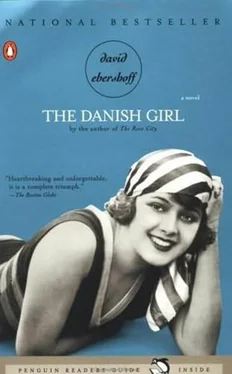“I really must be off,” Greta said.
“All right then,” Hans said. He helped her with her raincoat, tugging out the shoulders. “I’m sorry.”
Then the clerk said, his voice hoarse, “Will you be delivering any new paintings, Mrs. Wegener? Should I expect anything sometime soon?”
“Not for a while,” she said, and when she stepped into the street, with the motorcars swishing through the sleet and the shove of umbrellas on the sidewalk, she knew she’d have to fold up her easel and pack her paints and book a compartment on the next train to Dresden.
What surprised Greta most about Dresden was the way the people on the street failed to look up from their feet. She wasn’t used to that, eyes refusing to lift to roam her long frame and to greet her. On her first day there she felt as if she had disappeared-deeply tucked into the folds of Europe, hidden from the world. And this caused a little panic in her, as she felt the gravel crunch beneath her feet, stepping toward the front door of the Dresden Municipal Women’s Clinic; a panic because she suddenly feared that, if no one could find her, maybe she wouldn’t be able to find Einar after all.
At first there was confusion. “I’m looking for Miss Wegener,” Greta inquired at the front desk, where Frau Krebs was smoking a Hacifa cigarette.
The name Wegener meant nothing to Frau Krebs. She pursed her lips and shook her head, her exact line of hair slashing against her jaw. Greta tried again. “She’s slim and dark-eyed. Frightfully shy. A little Danish girl?”
“Do you mean Lili Elbe?”
Greta, who just then had a vision of Einar’s face lifting with the sunlight as his train crossed the Elbe on the Marienstrasse bridge, said, “Yes. Is she here?”
In her room a portable gas stove was flickering. The yellow curtain was drawn, and the blue flames of the little stove were casting a wavy shadow across the bed. Greta was holding the steel piping of the bed’s footrest. Tucked beneath the blanket was Lili, her arms lying flat along her sides. She was sleeping, breath in her nostrils. “Please don’t disturb her,” Frau Krebs whispered from the door. “The operation was hard.”
“When was it?”
“Three days ago.”
“How is she?”
“That’s not easy to say,” Frau Krebs said, folding her arms across her breasts. The room was warm with the effluvia of sleep, and its silence felt unnatural to Greta. She sat in the chair in the corner, pulling a blanket over her lap. She was cold, and tired from the train, and Frau Krebs left her alone with Lili.
They slept, Greta and Lili. A few hours later, when Greta woke, at first she thought she was waking from a nap on one of the sleeping porches in Pasadena. Then she saw Lili, whose head was rolling on the pillow. Her papery eyelids began to flutter.
“Please don’t worry about me,” Lili said.
At last Greta could see Lili’s eyes, the lids blinking heavily to swat away the dreamy sleep. Still as brown and slick as pelts. The only thing left of her husband, eyes through which Greta could recall his entire life.
She moved to the bed and began to stroke Lili’s leg through the rough horsehair blanket. Something in the calf muscle felt softer to Greta; or maybe she was just imagining it-the way she thought maybe she was also imagining the swell of breasts beneath the blanket’s sash.
“Do you know what they’ve done to me?” Lili asked. Her face seemed fuller in the cheek and throat, so full that the blade of her Adam’s apple had disappeared into a little scarf of flesh. Was Greta imagining this, too?
“Nothing more than we talked about.”
“Am I now Lili? Have I become Lili Elbe?”
“You’ve always been Lili.”
“Yes, but if I were to look down there, what would I see?”
“Don’t think about it like that,” Greta said. “That’s not the only thing that makes you Lili.”
“Was it successful, the operation?”
“Frau Krebs said so.”
“How do I look? Tell me, Greta-how do I look?”
“Very pretty.”
“Am I really a woman now?”
Part of Greta was numbing over with shock. Her husband was no longer alive. It, the tingling shock of it, felt like his soul passing through her. Once again Greta Waud was a widow, and she thought of Teddy’s coffin, stalks of bird of paradise across its lid, sinking into the earth. But she wouldn’t have to bury Einar. She had settled him into a felt-paneled compartment on a train bound for Germany, and now he was gone-as if his train had simply charged ahead into the icy January fog and disappeared forever. She imagined that if she were to call his name it would echo, again and again, for the rest of her life.
She moved even closer to Lili. Once again, Greta was filled with a need to hold her, and she took Lili’s head between her hands. The veins in her temples were throbbing lightly, and Greta sat on the edge of the hospital bed with Lili’s dewy head in her palms. There was a crack in the curtain, and Greta could see through it across a lawn brightening with spring toward the Elbe. The river was running like clouds dashing along the sky. On the other side two boys in sweaters were launching a canoe.
“Oh, hello,” a voice said from the door. It was a young girl, with a little upturned nose. “You must be Greta.”
Greta nodded, and the girl entered lightly. She was in her hospital gown and robe, her feet in slippers. Lili had fallen asleep again, and the room was gray. In the corner the gas heater was ticking, click-click-click. “I’m Ursula,” the girl said. “We’ve become friends.” With her chin she pointed to Lili. “Is she going to be all right?”
“I think so. But Frau Krebs was telling me how hard it’s been on her.”
“She’s been sleeping most of the time, but the one time I saw her awake she looked happy,” Ursula said.
“How was she before the operation? Was she frightened?”
“Not really. She adores Professor Bolk. She’d do anything for him.”
“He’s a good doctor,” Greta heard herself saying.
Ursula was carrying a little box wrapped in foil printed with UNTER DEN LINDEN in fancy scroll. She handed it to Greta, saying, “Will you give it to her when she wakes up?”
Greta thanked Ursula, noticing the bloat in her stomach. It distended unusually, high in her abdomen, lumpily. “And how are you?” Greta asked.
“Oh, me? I’m fine,” Ursula said. “More and more tired every day. But what can I expect?”
“Are they good to you here?”
“Frau Krebs is nice. She seems so strict at first, but she’s nice. And the other girls, too. But Lili is my favorite. So very sweet. Concerned about everyone but herself.” And then, “She told me about you. She missed you.”
For a moment Greta wondered what Ursula meant, but then let it pass. It didn’t matter.
“You’ll tell her I looked in?” Ursula said. “You’ll give her the chocolates?”
Greta took a room at the Bellevue. At night, after she had left Lili at the Municipal Women’s Clinic, she would try to paint. Light from the flat-bottomed coal freighters would reach up to her windows. Greta sometimes would open them, and she could hear the chug and swish of a tourist boat’s paddle and the deep grind of the freighters and the clang of a tram out in Theater-Platz.
She began a painting of Professor Bolk; it was on a large canvas she bought at a shop on Alunstrasse. She had carried the rolled-up canvas under her arm back to the Bellevue, crossing the Augustusbrücke. From the bridge with its half-circle lookout balconies she could see nearly all of Dresden: the Brühlsche Terrace with its benches freshly painted green; the bulbous sandstone dome of the Frauenkirche blackened with soot from the motorcars and the smelting works in Plauenscher Grund; the long line of silvery windows of the Zwinger Palace. A wind from the river came along and knocked the rolled-up canvas from beneath Greta’s arm, and she caught it just as it unfurled like a sail on the bridge. It was flapping over the grooved-stone half-wall, and Greta was struggling to roll it back up when a hand landed on her shoulder and a familiar voice said, “May I help?”
Читать дальше












